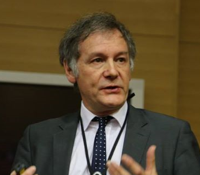ON THRESHOLD CONCEPTS AND TROUBLESOME KNOWLEDGE
 Ray Land is Professor of Higher Education bij de Durham University en directeur van het Durham's Centre for Academic Practice. Eerder bekleedde hij eenzelfde posities op de universiteiten van Strathclyde, Coventry en Edinburgh. Hij heeft als consultant voor de OECD en de European Commission(EC) gewerkt en is recentelijk ook bezig met EC projecten in Europa en Latijns-Amerika. Tegenwoordig werkt hij als adviseur voor het Noorweegse TRANSark project over 'architectural education'.
Ray Land is Professor of Higher Education bij de Durham University en directeur van het Durham's Centre for Academic Practice. Eerder bekleedde hij eenzelfde posities op de universiteiten van Strathclyde, Coventry en Edinburgh. Hij heeft als consultant voor de OECD en de European Commission(EC) gewerkt en is recentelijk ook bezig met EC projecten in Europa en Latijns-Amerika. Tegenwoordig werkt hij als adviseur voor het Noorweegse TRANSark project over 'architectural education'.
Meest bekend is Ray vanwege zijn theorie (met Jan Meyer) over Treshold Concepts en Troublesome Knowledge. Een recent boek, Thresholds Concepts in Practice (HEA 2015) is het vierde boek uit een vijf-delige serie over dit onderwerp. Zijn laatste publicaties met George Gordon zijn Enhancing Quality in Higher Eduction: International Perspectives (Routledge 2013) en Teaching Excellence Initiatives: modalities and operational factors (HEA 2015). Hij is lid van de Royal Society of Arts en lid van de Higher Education Academy. Hij woont in Edinburgh, Scotland.
Meer informatie kan hier gevonden worden.
Omdat de lezingen en workshops in het engels zijn, zijn de beschrijvingen van deze ook alleen beschikbaar in het engels.
Lecture 1 – Introduction to Threshold Concepts and Troublesome Knowledge
The ‘threshold concepts’ approach to student learning advocates the idea that certain concepts or practices can act in the manner of a portal, through which a changed perspective opens up for the learner. The learner enters new conceptual territory, which permits previously inaccessible ways of thinking and practising. These conceptual ‘gateways’ are often the points at which students experience difficulty and get stuck. They encounter ‘troublesome knowledge’ which requires a letting go of their earlier ways of ‘seeing’ and understanding a topic. Students often find themselves in an ‘in-between’ state (referred to as a ‘liminal’ state) where they can remain for some time in trying to figure out the new way of seeing they need to acquire. However, this space is also a space of transformation, in which they not only gain new conceptual understanding, but often have to change as a person.
This talk will outline the particular characteristics of threshold concepts and discuss the ways in which knowledge might be troublesome. It will provide examples from different disciplines and look at the implications of this approach for student learning, course design and modes of teaching.
Lecture 2 – Troublesome Knowledge: issues of student engagement and responsibility
Neoliberal notions of universities as existing within a system of market competition, based on ‘excellence’, have become increasingly prevalent in Western countries in the last two decades. Constructing the learner as a consumer, however, does not sit easily with critical or transformative notions of pedagogy. Consumer satisfaction surveys and module evaluation scores in universities can often put students and their teachers in opposition to each other and intensify competition between colleagues and courses. In this way teaching can become risk-averse and learning can be depicted as comfortable and non-problematic. The Threshold Concepts Framework, emphasising transformation through ‘troublesome knowledge’ offers a very different discourse to the commodification of learning. It requires students to ‘venture into strange spaces’ (Barnett 2007). As Shulman (2005) notes, ‘without a certain amount of anxiety and risk, there's a limit to how much learning occurs. One must have something at stake. No emotional investment, no intellectual or formational yield’. This session will explore the implications of this approach and the responsibilities it places on both teachers and students.
Workshop 1 – Spotting Threshold Concepts, and what to do next?
In this workshop, you will work in student-teacher couples on ‘spotting’ potential threshold concepts. Next, you’ll discuss your findings plenary, and will go into ways of tackling and using threshold concepts to enhance learning and teaching. Facilitators: Ray Land, Frank van den Berg, Hans van den Berg
Workshop 2 – Taking the high road, or the low road?
In this workshop, sub-groups (of couples) will discuss the issue of ‘student satisfaction’ – the low road – compared to the troublesome nature of threshold concepts required for deep learning – the high road. You will continue this in a plenary discussion aimed at producing recommendations. Facilitators: Ray Land, Frank van den Berg, Hans van den Berg.
